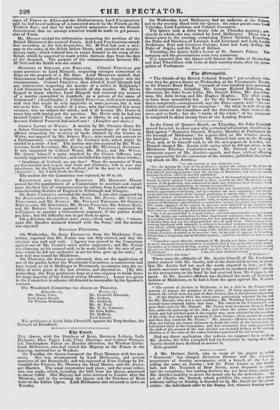In the Court of Queen's Bench, on Thursday, Sir John
Campbell moved for a rule to show cause why a criminal information should not be filed against " Benjamin Disraeli, Esquire, Member of Parliament for the borough of Maidstone," for a gross libel on Mr. Charles Austin, the barrister. In a letter which Mr. Disraeli had sent to the Morning Post, and, as be himself said, to all the newspapers in London, Mr. Disraeli charged Mr. Austin with saying what be did not utter, in the Maidstone Election Committee-room. Mr. Disraeli had seen an erroneous report of Mr. Austin's speech, and then, without affording any opportunity for the correction of the mistake, published the follow-
ing attack on Mr. Austin- .' TO THE EDITOR OF THE MORNING POST.
'Sir—In opening the case of the petitioners against the return of Mr. Feeler fer Maidstone on Friday last, Mr. Austin stated, that Mr. Iv Israeli. at the general electios, bad entered into engagements with the electors of hluidstoue, loud made pcuilisry promises to them, %Well he had left unfulfilled.' " I should have instantly noticed this assertion of the learned gentlemen hod not e friend, to whose opinion I was bound to defer, assured me that Mr. A ostin. by the custom of his profession, was authorised to make any statement from lns brief militia he was prepared to substantiate, or attempt to substantiate. " The inquiry into the last Maidstone election has now terminated; and I take the earliest opportunity of declaring, and in a manner the most unqualified and imolai. vocal, that the statement of the learned gentleman is utterly false. There is not tho slightest shadow of foundation for it. I myself never, either directly or indirectly, entered into any pecuniary engagements with, or made any pecuniary promises to doe electors of Maidstone; and therefore, I cannot have broken tiny, or lent an) moral tilted. The whole expenses of the contest in question were defrayed by my lantented col. league; and 1 discharged to him my moiety of those expenses, as is well huuou to those who are entitled to any knowledge on the subject. " Sir, I am intermit that it is quite useless, and even unreasonable, in mo to expect from Mr. Austin any satisfaction tor these impertinent calumnies, because Mr. Austoo Is a member of an honourable profession), the first principle of whose practice appears to be that they may say any thing provided they be paint for it. The pi it ilege Melt- culating falsehoods with impunity, is delicately described as doing your duty towards your client ; which appears lobe it very different prowess to doing your duty towards your neighbour. This may be the usege of Mr. Attstin's profession, and it m .y 6. the custom of society to submit to its practice; but, for my part, it appears to tie nothing shieitnteerethan a disgusting and intolerable tyranny ; aud 1 for one shall not bow to it in "I therefore repeat, that tlae statement of Mr. Austin was false; and inastnuch as ho never attempted to substantiate it, I conclude that it was on his side but the bluster. ing artifice of a rhetorical hireling, availing himself of the vile licence of a louse to, gsed laurr, not tag to mate a statement which was false, but to make it with a consci sesuess uf its falsehood. I am, Sir, your obedient servant, " Carlton Club, 5th June." 6' B. DISRAELI."
There were the affidavits of Mr. Austin himself, of Mr. Cockburn, junior counsel with Mr. Austin, and of the short-hand-writer, to prove that Mr. Austin had not used the words imputed to hint ; and Mr. Austin moreover swore, that in his speech he confined himsel: strictly to the instructions in the brief he bad received from Mr. Coppork, the agent. In Mr. Austin's affidavit was disclosed the mode of bribery in fashion at Maidstone, as he had it from the agent against Mr. Fector's return- " The system of election at Maidstone, is for a club in the Conservative interest to engage the promises of the voters. If those promises were per. formed, the voters were not paid at that election, but at the election succeediog it. At the election in 1837, the voters were particularly solicited by the club for Mr. Disraeli, who was a new candidate; Mr. Windham Lewis haviug been several times returned before that time. The voters on the Conservative sale gave their votes for Mr. Disraeli. Mr. Fector went to canvass them in Malcit last, under the patronage of the club ; and when the voters who had before voted, and had not been paid in the regular way, were solicited by the members of the club, they demanded payment of their arrears ; those arrears were paid, and then they voted for Mr. Fector." Mr. Austin's affidavit went on to state, that, not having any reason whatever to doubt the truth of the instiuctions, be had stated them to the Committee, and had contended that such payment by the club of the arrears of the last election was as much bribery at the existing election as if the votes of the voters bad been purchased for the occasion.
Had any direct application (for redress, we suppose) been made to Mr. Austin, Sir John Campbell bad no hesitation in saying that Mr. Austin should have declined to answer it.
Rule granted.


























 Previous page
Previous page